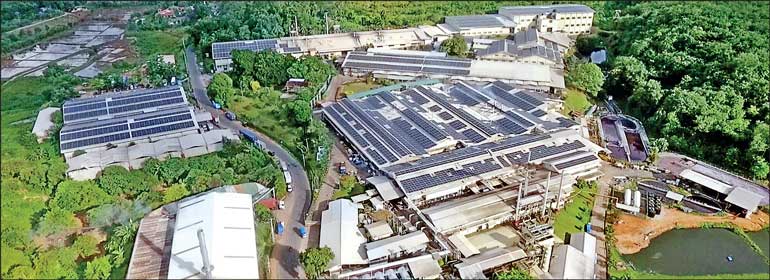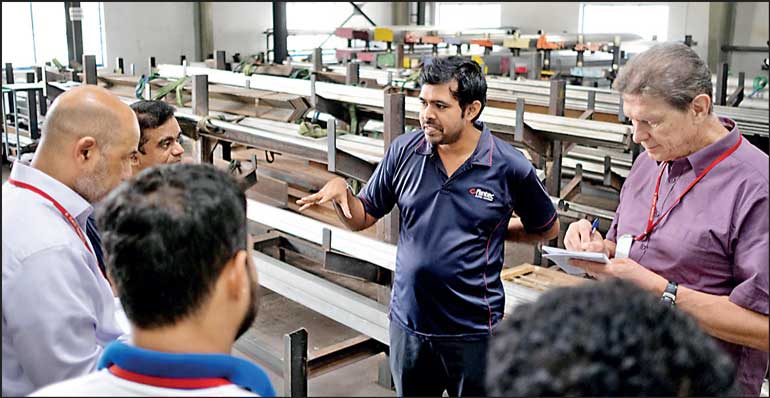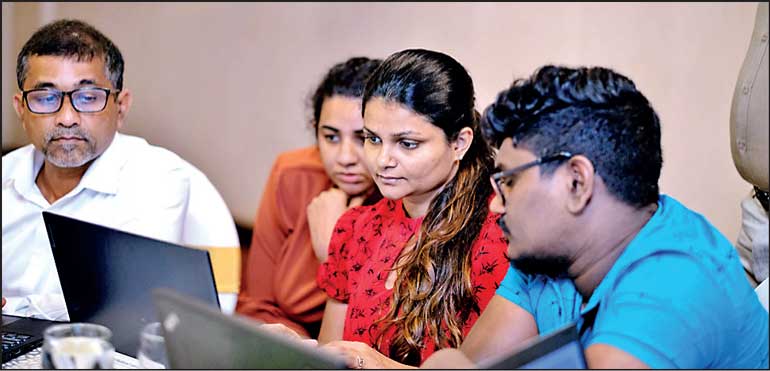Thursday Feb 19, 2026
Thursday Feb 19, 2026
Tuesday, 6 June 2023 00:20 - - {{hitsCtrl.values.hits}}

The solar panel installation atop the Hayleys Fabric plant in Horana

An Energy Management Systems (EnMS) training in progress

UNIDO conducts regular training for Energy Savers across various industries
 Sri Lanka’s Energy Savers are industry leaders and energy practitioners who are determined to help the country slash energy waste and greenhouse gas emissions. They explain what they are doing to decarbonise Sri Lankan industries and why the time to act is now.
Sri Lanka’s Energy Savers are industry leaders and energy practitioners who are determined to help the country slash energy waste and greenhouse gas emissions. They explain what they are doing to decarbonise Sri Lankan industries and why the time to act is now.
One of Southeast Asia’s largest fabric manufacturers, Teejay Lanka Engineering Manager Mendaka Hettithanthri says the changing climate is a sure sign that industry must do more to lower its carbon emissions.
“You can already see how global warming is affecting Sri Lankans. We are an agricultural country … and the farmers used to know exactly when to harvest the crops and when to replant. Now the weather patterns are completely messed up.”
Leading Sri Lankan engineering company Hayleys Fentons Group, Manager of Group Compliance Nisal Liyanage says there are also many business benefits to decarbonisation, such as production cost savings: “We would see reduced greenhouse gas emissions and the potential for greater energy independence for us as a country.”
“We are further incentivised by our foreign customers,” adds fabric manufacturer Hayleys Fabric Environment, Health and Safety Manager Mohomad Arshad. “Compliance with international controls and requirements related to green practices are essential for remaining competitive in the global market.”
Sharing knowledge
More knowledge is needed to help companies fully realise the potential of energy efficiency, says Industrial Development Board of Ceylon Assistant Director of Planning Nadeera Ramanayake.
She welcomes a new 12-month initiative spearheaded by United Nations Industrial Development Organisation and the National Cleaner Production Centre Sri Lanka with support from the European Union. They are guiding a first group of 70 Energy Savers through an internationally recognised course on Energy Management Systems.
“Amidst the current energy crisis in the country, I thought that joining a project like this and getting knowledge is vital,” says Nadeera.
Changing behaviour
Colombo Dockyard Energy Management Officer Damitha Sandanayaka says cutting energy waste requires new ways of acting at all levels of a business.
“I strongly believe that changing human behaviour is the key to improving energy efficiency, which is why training and awareness have become fundamental to our organisation. We conduct regular training … [and] we also initiated Energy Management Week... This promotes awareness on the importance of energy management and encourages teams to work together to achieve energy efficiency goals.”
Making the switch to clean energy
Cutting energy waste often helps manufacturing companies better understand their energy use, creating a solid foundation upon which to build effective renewable energy solutions.
Flintec Transducers Senior Manager of Production and Facility Maintenance Asanka Manoj describes how installing rooftop solar panels on the company’s plants cut daytime energy use by 65 to 70%. This, coupled with energy efficiency measures, has helped Flintec significantly reduce energy costs and emissions.
But a number of Energy Savers caution against looking for a “magic bullet” to decarbonisation. Rather, multiple solutions that use a variety of energy optimisation and clean energy technologies are needed.
“[We need to take] a holistic approach,” says K.H. Thanushka at Watawala Plantations. “[That’s how] to unlock this potential and create a more sustainable and prosperous future for all.”
(The writer is a specialist in climate change mitigation in industry and is Chief Technical Specialist for the Accelerating Industries Climate Response project in Sri Lanka implemented by UNIDO.)